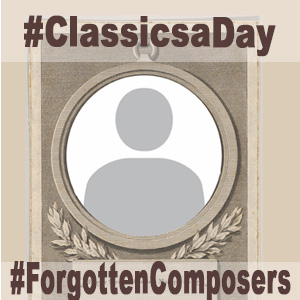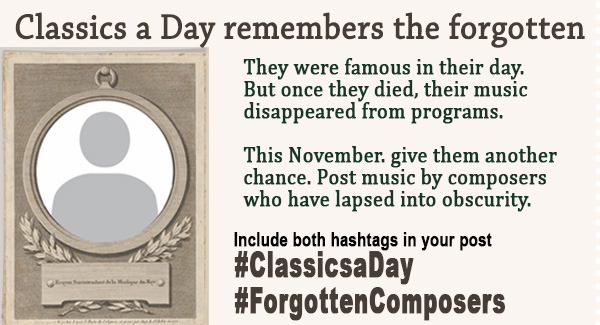
ClassicsaDay #ForgottenComposers Week 4
By Ralph Graves
This month the Classics a Day team presents a real challenge. And that’s to remember forgotten composers. It’s a challenge, but remembering the forgotten can be important, too.
The idea here isn’t to lift up composers who always labored in obscurity. Rather, the goal is to recall composers that were once popular.
Throughout this month, many of the composers I’ll be featuring will have the same story. During their lifetime they were famous and popular. People flock to hear them play, publishers fight for the rights to their music, and younger composers emulate their style.
And yet, after their death, it all goes away — and quite quickly. Usually, within a decade their music’s out of print, no one performs or discusses them, and they’re virtually eliminated from music history.
Why? The reasons vary. Sometimes it’s gender or racial bias. Sometimes it’s political upheaval. Sometimes tastes just change.
Here are my posts from the second week of #ForgottenComposers. I’ll leave it to you to judge if they deserve to remain so.
11/21/22 Carl Loewe: Erlkonig
In the mid 1800s, Loewe was renowned as a tenor and as a composer of dramatic ballad. He was called the “Schubert of North Germany,” and his music was admired by Wolf and Wagner. In time they would overshadow Loewe and his music fell into obscurity.
11/22/22 Thomas Arne: Ouverture to “Alfred”
Thomas Arne was Britain’s premier composer of theatrical music, composing one hit after the other. Today, he’s remembered for just two tunes: “Rule Britainia,” and “A Hunting We Will Go.”
11/23/22 John Knowles Paine: Symphony No.2 in A-major, Op.34 “Im frühling”
Paine was a major figure in late 19th Century American music. He founded the AGO, developed Harvard’s music curriculum, and was a director of the New England Conservatory of Music. His music was regularly performed until after World War I when European repertoire became the norm in American concert halls.
11/24/22 Hans Pfitzner: “Palestrina,” Act I Prelude
Pfitzner was a rising star in 1920s Germany. His contentious relationship with the Nazis hampered his career somewhat. But because he didn’t fully break with the regime, his music wasn’t performed much after the war.
11/25/22 Moritz Moszkowski: Piano Concerto in E major, Op. 59
Moszkowski was considered the greatest Polish composer/pianist after Chopin. His tours were always successful, and he was one of the most sought-after piano teachers of the 1890s. His health declined in the early 1900s, and his fame soon vanished — as did his music from the concert hall.



